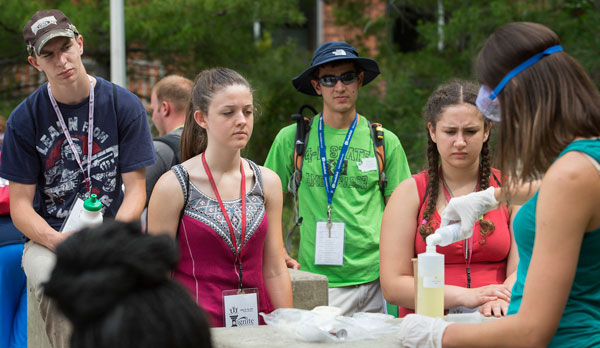Class attracts both environmentalists and Zombie enthusiasts
By Betsy Fradd, WSU Extension

Tapping into environmental awareness and the trending Zombie craze, 17-year-old Travis Gylling and two dozen other high school students discovered how relatively simple it is to make biofuel at the annual Teen Conference at Washington State University in Pullman. “Initially, the title of the workshop ‘Survive the Zombie Apocolypse: Learn how to make your own biofuel’ drew me in,” said Gylling, a senior at Ellensburg high school. “Biofuels are a great alternative. If we start experimenting today and perfecting the process we can be prepared for the future.”
To make biofuel, in this case biodiesel, Marina Heppenstall, Washington State University Extension Coordinator, used a mixture of methanol and lye which she then added to filtered vegetable oil. “Converting a waste product such as fry grease into biodiesel can be an inexpensive and renewable alternative to petroleum-based diesel,” said Heppenstall. “Educating students to explain biofuels and energy issues is often the first step toward sparking an interest in pursuing more education and possible careers in this growing field.”
Biodiesel, which is typically made from canola or waste oil, is just one example of renewable transportation fuels. In the Pacific Northwest there are several feedstocks and refineries to support an emerging biofuels industry. Heppenstall works on the Advanced Hardwood Biofuels Northwest (AHB) project, which is researching poplar trees as a potential feedstock for jet-fuel, cellulosic ethanol, and other advanced biofuels.

In her demonstration, Heppenstall improvised a lantern out of a can and a wick. “First we used plain vegetable oil to see if it would burn which it didn’t,” explained Heppenstall. “Then we tried the biodiesel that we had made, and it did burn creating a flame. Students saw there had been a chemical change from oil to diesel.”
Teens held a bag with the mixture of lye and methanol and felt the heat released during the process. The mixture was then transferred into the vegetable oil where students shook the bottle and watched as the glycerin settled to the bottom and biodiesel rose to the top.
“Students learned that a group of local high school teens started making biodiesel to run school buses from their school cafeteria’s used fry grease,” said Heppenstall. “Youth are very innovative—if they are inspired they can start great projects in their communities.”
Travis Gylling is eager to do his part. “Biofuels appeal to me because they will most likely be an increasing fuel source in my lifetime. If more young people learn about our dependency on petroleum products, maybe they will think twice about fuel consumption while driving and pollution and its related effects. Biofuels are a solution for the future.”
